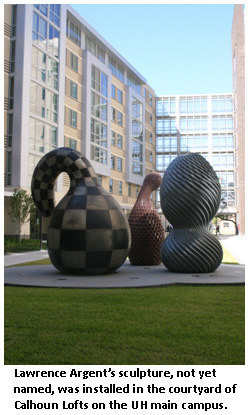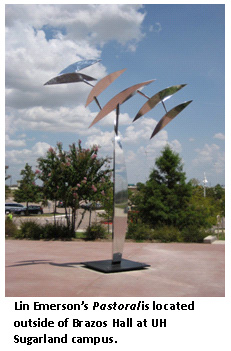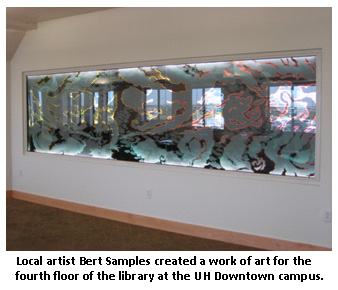|

|

NEW WORKS OF ART INSTALLED AT THREE UHS CAMPUSES
 Back in 1966, our wise university
leaders made a decision that continues to enhance and add
prestige to our campus. President Philip Hoffman and the Board
of Regents realized the university was about to grow
dramatically and knew art could add to the beauty of the campus
landscape. They voted to establish a progressive policy that
would dedicate one percent of construction costs for all future
building projects to works of art. Because of this decision
many years ago, the University of Houston currently has one of
the largest notable public art collections in the country. Back in 1966, our wise university
leaders made a decision that continues to enhance and add
prestige to our campus. President Philip Hoffman and the Board
of Regents realized the university was about to grow
dramatically and knew art could add to the beauty of the campus
landscape. They voted to establish a progressive policy that
would dedicate one percent of construction costs for all future
building projects to works of art. Because of this decision
many years ago, the University of Houston currently has one of
the largest notable public art collections in the country.
Last fall semester, the University of Houston System made
three additions to its collection. The System-wide Art
Acquisition Committee comes together each month to make
decisions about artists and locations for public art within the
system. The committee is made up of UHS regents, representatives
from each campus, local museum curators and directors, and
community representatives. Once a location is determined, the
committee will narrow down a list of artists and hear from a few
top candidates whose work best fits the space available.
Occasionally, a piece of art that already exists will be added
to our system�s public art collection, however, it is more often
created specifically for that space.
The newest addition to the UH main campus has been two years in
the making. Lawrence Argent, an artist originally from Australia
who now lives and works in Denver, created three enormous
sculptures of gourds that he designed through 3D modeling
software. He presented a proposal for his idea for the courtyard
at Calhoun Lofts two years ago.
�At this point, Lawrence had only done projects in Colorado but
he was so thoughtful in his proposal and presentation that he
won us over,� said Michael Guidry, curator of University Art
Collections.
 The three gourds, two made of granite and the third made of
bronze, have a unique texture, color and shape. They were carved
by hand and shipped to the campus from China. Argent�s sculpture
will be complete once the base of the artwork is installed.
After it is finished, a light will illuminate each of the three
gourds from its base. The three gourds, two made of granite and the third made of
bronze, have a unique texture, color and shape. They were carved
by hand and shipped to the campus from China. Argent�s sculpture
will be complete once the base of the artwork is installed.
After it is finished, a light will illuminate each of the three
gourds from its base.
Argent explained his decision on the gourds in his proposal
stating, �The University is a place for the exchange of
dialogue. A learning environment: it provides a site for people
from all over the world to intellectually, mentally and
physically come together. It is with these aspects in mind, that
I found myself attracted to the gourd as a form and its attached
history.�
Outside of Brazos Hall at the UH Sugarland campus is a 15-foot
tall kinetic sculpture created by Lin Emery called Pastoral.
Emery grew up in New York and traveled the world, eventually
settling in New Orleans. The sculpture, which moves with the
wind, was installed in October by Emery and her assistants.
Emery, in her 80�s, created the aluminum and stainless steel
sculpture entirely in her studio.
�In a time when many artists have their larger work fabricated
by others, it�s surprising she is so hands on and creates the
work in her studio,� Guidry said. �This elegant sculpture is
hypnotic in the way it rotates around itself, akin to cloud
watching. The leaf-like forms seem to disappear in the sky and
return to their inherent form or reflect the surrounding brick,
concrete and trees all the while reflecting the sun�s light
against the ground and building like a mirror ball. It�s like an
organic machine.�
 The last of the new additions to the University�s public art
collection was installed at the UH Downtown campus in the fourth
floor of the library. Local artist Bert Samples created a glass
work of art that was inspired by earth, air, fire and water.
Samples created his vision first in a sketch of each of the
elements and then layered his creations to form the complete
composition. The composition was then etched onto10 sheets of
glass with dichromatic film edging to create the colorful work
of art. The piece is titled, �Manu Languidly Stirs Songs in the
Grip of Shadow and Light.� Samples said �Manu� is an oceanic
term that refers to the creation of life. The last of the new additions to the University�s public art
collection was installed at the UH Downtown campus in the fourth
floor of the library. Local artist Bert Samples created a glass
work of art that was inspired by earth, air, fire and water.
Samples created his vision first in a sketch of each of the
elements and then layered his creations to form the complete
composition. The composition was then etched onto10 sheets of
glass with dichromatic film edging to create the colorful work
of art. The piece is titled, �Manu Languidly Stirs Songs in the
Grip of Shadow and Light.� Samples said �Manu� is an oceanic
term that refers to the creation of life.
�The oceanic stories of Manu refer to the life force in every
element in all things. I see it as the divine spirit of life. It
seems enigmatic, but the name brings me close to the
indecipherable meaning about the knowledge of our existence,�
Samples explained.
A dedication for Samples� work of art took place on November 9.
For more information or to view the University�s current public
art collection, visit
www.uh.edu/uh-collection.
|
|
